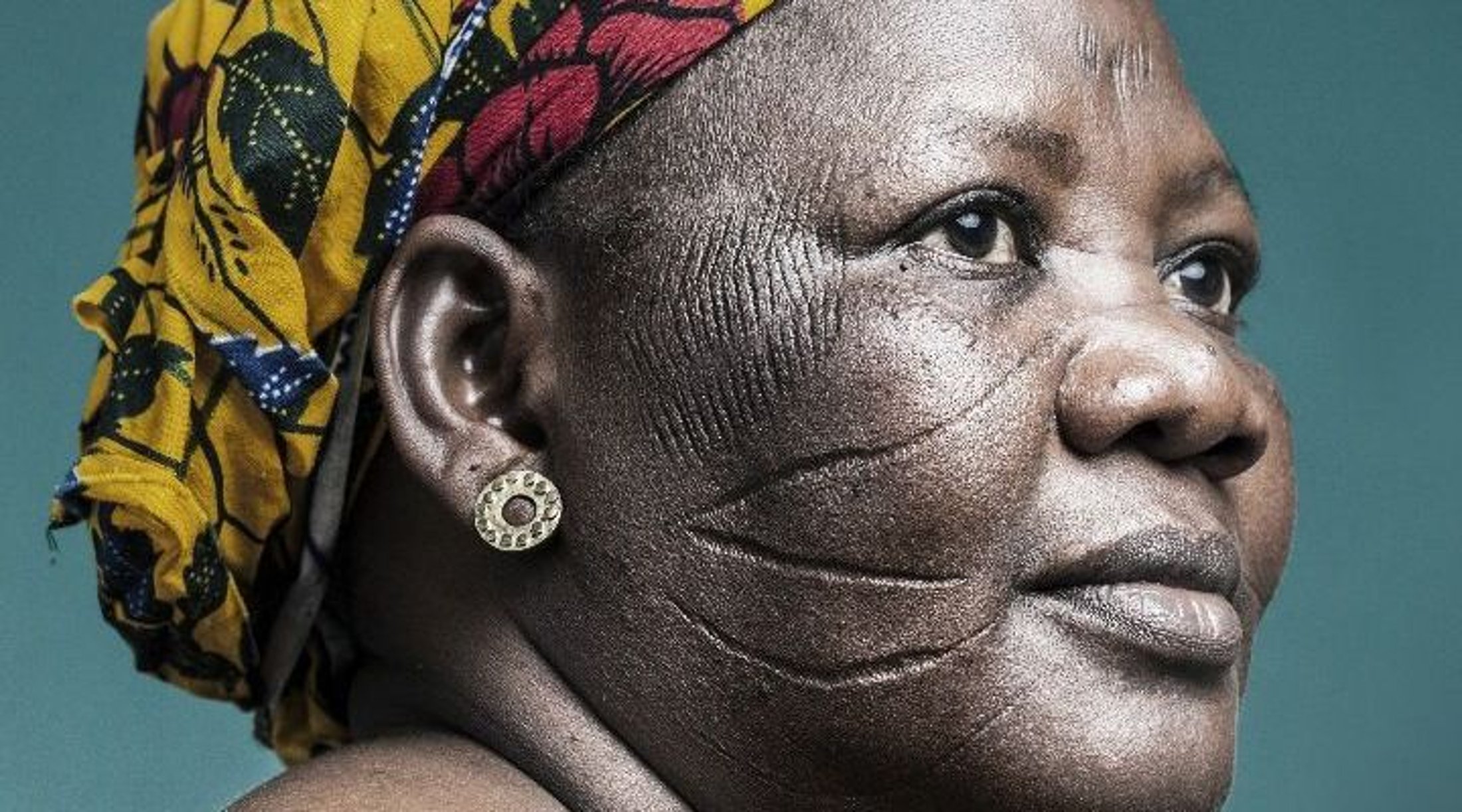Ms. Djeneba : " I used to like my scars; they were beautiful. We used to brag about them. But, now, in the city, it is definitely out of fashion." © Joana Choumali. Ms. Djeneba, shop owner,
Ko tribe from Burkina Faso
“People find it pretty, but I
think it's ugly.
We are not like others. In the
past, when you had a
smooth face, you were
rejected! I used to like my
scars; they were beautiful.
We used to brag about
them. But, now, in the city, it
is definitely out of fashion.
You are called names like
“torn face” and it hurts.”
Mrs. Sinou : "I refuse to do it to my children. This will stay on my face only.” © Joana Choumali. Mrs. Sinou, mais, Kô tribe
from Burkina Faso
“I was born in Ghana. My
aunt took me to the village,
and they did the scars
without my father’s consent.
My father was upset. When
you go out, and get into
trouble, the main insult
people use to hurt you is
“scarred”. I refuse to do it to
my children. This will stay on
my face only.”
Mr. Konabé : “Our parents did this not to get lost in life. When you went somewhere, you could not get lost." © Joana Choumali. Mr. Konabé, tailor, Kô tribe
from Burkina Faso
“Our parents did this not to
get lost in life. When you
went somewhere, you could
not get lost. If you saw
someone with the same
marks on their faces, you
would approach them you
because you knew you were
related in some way.
Today, those who moved to
the city do not want to do it
because they are teased.
This was done to me by
force… I was 8 years old. If
there was a way to take them
off, lots of people would
remove their scars.”
Mr. Lawal : "It is here in town that I am 'nobody'. In the village, I am a noble; people bow down when they see my face! I am proud of that.” © Joana Choumali. Mr. Lawal, hairdresser,
Yoruba tribe from Nigeria
“I am proud of my traces. I
like them because I am heir.
The King has the same scars.
I am part of the royal family
in my village. It is here in
town that I am “nobody”.
In the village, I am a noble;
people bow down when they
see my face! I am proud of
that.”
Mr. Salbre : “ I do not want this for my children. We are the last generation " © Joana Choumali. Mr. Salbre , gardener,
Bissa tribe from Burkina Faso
“I am a retired man now. I
was very young… I do not
want this for my children.
We are the last generation;
you won’t find people under
40 who have scarifications.”
Mr. Pousnouaga : "It was like an identity card in my family. Each tribe has their scars.” © Joana Choumali. Mr. Pousnouaga,
gardener, Bissa tribe from
Burkina Faso
“One of my aunts did it to
me. We paid with shea
butter or guinea fowls. It
does not please me, and it
belongs to the past. It was
like an identity card in my
family. Each tribe has their
scars.”
Ms. Martine : “When I was 10 years, I asked for them. I wanted to be like my brothers and sisters, and to show that I am courageous. " © Joana Choumali. Ms. Martine, 39,
housewife, Bissa tribe,
Burkina Faso
“When I was 10 years, I
asked for them. I wanted to
be like my brothers and
sisters, and to show that I am
courageous. I was very
eager. I liked them. I did not
feel pain, because I really
wanted them. Times have
changed, but it’s okay. When
people see me and point at
me I stand tall and I am
proud. I had them done on
my first son, he was 18. I
would do to have them done
on my second child, but my
husband disagrees.”
Ms. K. Benin : “People would go in groups to get their scarifications, and I went with my friends…" © Joana Choumali. Ms. K. Benin, housewife
Ko tribe from Burkina Faso.
“People would go in groups
to get their scarifications,
and I went with my friends…
Now, these practices are
prohibited by law in Burkina
Faso”.
Mr. Boudo : "It is not easy to hit on girls with that. Especially, the Ivorians. I think it is not very attractive.” © Joana Choumali. M. Boudo., taxi driver, Ko
tribe from Burkina Faso
“It was fashionable at some
point. Today, if there was a
way to erase them, I would...
It is not easy to hit on girls
with that. Especially, the
Ivorians. I think it is not very
attractive.”
Mr. Guemi : "I already wear my identity card on my face. This is the reason why people did it : to recognize one another. But now, this is over. We can no more be recognized.” © Joana Choumali. Mr. Guemi, painter,
Kô tribe, Burkina
Faso
“I was a kid, but I still
remember the wounds on
me. When you didn’t have
them, your friends would
laugh at you, and put you
aside. During wars, Mossi
and Ko tribes would recognize
each other, and therefore
avoid killing one
another. It was a way of
recognition. When you
would look for work, no one
would ask you where you’re
coming from… It is already
done, and I like them. I
cannot change. No need for
an ID card, I already wear my
identity card on my face.
This is the reason why
people did it: to recognize
one another. But now, this is
over. We can no more be
recognized.”





